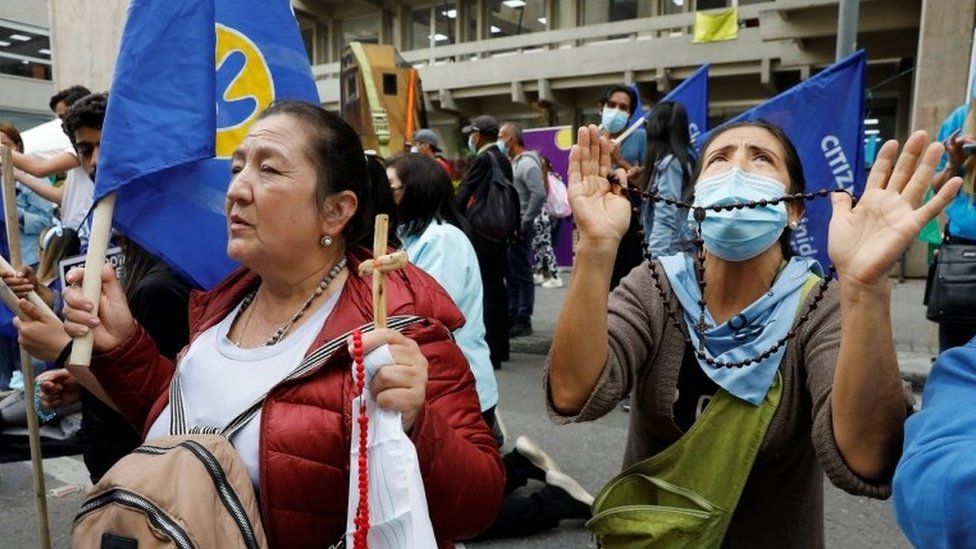
Audio By Carbonatix
Colombia's constitutional court has decriminalised abortions within the first 24 weeks of pregnancy.
Under the new rules, no one will be prosecuted for having an abortion within that time frame.
Since 2006, abortions have been allowed in Colombia in cases of rape, when the woman's life is at risk, or if the pregnancy is not viable.
The ruling was welcomed by pro-choice groups, who called it "a historic achievement".
But Archbishop José Luis Rueda said the Catholic Church would "continue to proclaim, defend and promote human life from gestation until natural death".
Pro-choice activists say it is the latest in a series of victories in recent years, including a similar ruling by Mexico's Supreme Court in September and the legalisation of abortion up to the 14th week in Argentina.


This is a massive step for Latin America, a Catholic region and one with deeply conservative values.
But the fact that Mexico, Argentina and now Colombia have decriminalised abortion feels like there is momentum growing.
The activist movement in the region has been huge these past few years and that has definitely influenced change.
But the fight is not over yet. Many Latin American countries still severely limit abortion rights, namely Brazil, the region's biggest nation by far.
And in several Central American states abortion is banned outright, even in the case of rape and incest.
There are women in prison serving long sentences, many of whom say that they suffered miscarriages. But with so few reproductive rights in some countries, women who need medical help are instead abandoned by the state.

The ruling came about as a result of a lawsuit filed by the umbrella group Causa Justa (Just Cause) whose aim is to have abortion removed from the penal code.
Causa Justa argued that because abortions were defined as a crime outside of the three cases allowed under the 2006 ruling, doctors who performed abortions and their patients were often stigmatised.

The group estimates that 90% of abortions in Colombia are carried out clandestinely, putting the health and life of women at risk.
While Monday's decision has not removed abortion from Colombia's penal code entirely, it is seen as a victory in the battle to widen access to the procedure.
Following its 5-4 ruling, the court urged the Congress and the government to come up with legislation which will protect the rights of pregnant women, including providing family planning services, eliminating obstacles to abortion care and helping with adoptions.
Latest Stories
-
Life begins at 40: A reflection on experience and leadership
19 minutes -
Maresca leaves Chelsea after turbulent end to 2025
42 minutes -
NPP still hurting after 2024 loss – Justin Kodua
52 minutes -
Ghana declares war on illegal streaming of pay-TV content
55 minutes -
Vice President leads 44th anniversary commemoration of 31st December Revolution
56 minutes -
Valencia coach Fernando Martin dies in Indonesia boat accident
1 hour -
Nigeria AG’s intervention brings relief to River Park estate investors – JonahCapital
1 hour -
High number of youth behind bars is a national loss – Ashanti regional prisons commander
2 hours -
Nhyira Aboodoo shifts to monumental projects, injects GH₵270,000 into Ashanti orphanages
2 hours -
Police restores calm after swoop operation at Aboso
2 hours -
Through thick and thin in 2025: KGL Group makes national, global impact
2 hours -
Clean Air Fund sets 2026 targets, pushing gov’t toward funding, tougher laws and real health gains on air pollution
2 hours -
New Year begins with 15.92% water and 9.86% electricity tariff hikes
3 hours -
TUC, PURC call for calm amid power tariff concerns, assure public of stakeholder engagement
3 hours -
New VAT is a game changer for Ghana’s revenue collection – GRA Boss
3 hours

